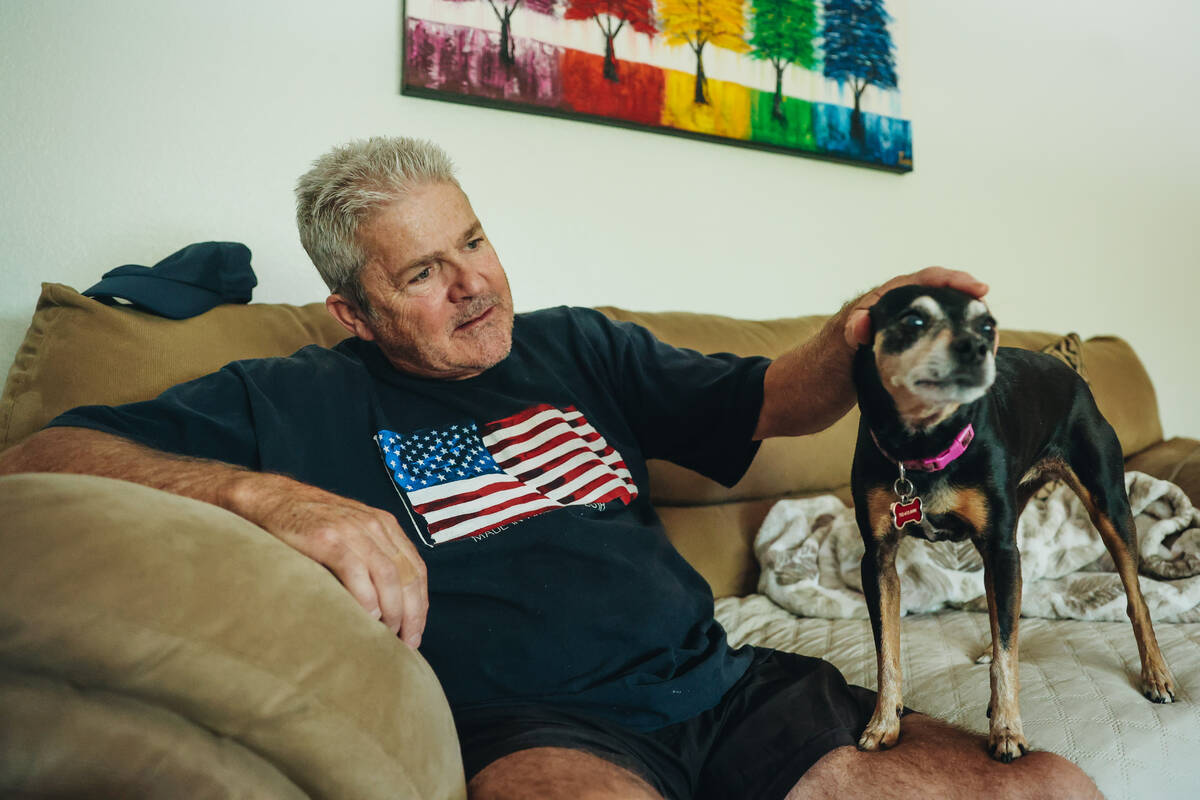Gambling
‘I would steal their coins’: Center uses cognitive therapy to help gambling addicts

Scott Rebik recalls when in the 1980s, his gambling addiction was so serious that after losing his money in Las Vegas casinos, he began stealing coins from people at slot machines.
“If they were playing and facing the machines, I couldn’t do that,” Rebik said. “But if they were playing, like leaning over here and they have a bucket of coins here, I would steal their coins. I got away with it until I got caught.”
He was arrested and spent 30 days in the Clark County Detention Center for petty larceny. A couple of weeks later, he again blew his funds gambling at a Laughlin casino and was arrested on suspicion of taking people’s coins.
“I didn’t steal unless I lost my money,” said Rebik, 63, a former Nevada prison corrections officer. “You know, I had to keep the addiction going.”
On the way back to jail in Las Vegas, with a sympathetic police officer who was also a drug and alcohol counselor, Rebik spoke about his abusive childhood and soon convinced himself he was “sick and tired of being sick and tired — the last straw.”
Recent relapse
In Las Vegas, he went through Gamblers Anonymous group meetings and the program at what’s now known as the Dr. Robert Hunter International Problem Gambling Center.
That was about 21 years ago. But recently amid family turmoil, Rebik relapsed, winning $17,000 on blackjack at first, going through that, then maxing out five credit cards, withdrawing all of the equity in his Las Vegas home and finally losing it all betting on the card game.
While also suffering from depression, treatment for throat cancer and broken bones, plus problems with alcohol, sex addiction, and relatives upset over his casino losses, Rebik stopped gambling.
“If I really think about it, like I’ve already admitted to my innermost self, hundred percent, I’m a compulsive gambler,” he said. “The disease is driving, and it’ll tell me what to do. Oh, max out the equity in your house. That sounds like a good idea. I’m a slave to the addiction.”
Last December, Rebik returned to the Problem Gambling Center and into its six-week program of intense counseling and group sessions with other problem gamblers.
His experience is common for problem gamblers, but not at all for the vast majority of people who gamble in Nevada’s legal gaming businesses, according to Stephanie Goodman, the center’s executive director.
About 94 percent of all bettors in the state do so without lasting difficulties, but the other 6 percent have a problem, a percentage that’s higher than the national average, Goodman said.
“So if you have 94 percent of your clientele that can control their gambling games responsibly, it’s a great convenience to have that right,” said Goodman, whose father dealt baccarat for years at Caesars Palace.
Officials with large casino companies on and off the Strip appreciate the issues what problem gamblers face and support what the center is trying to do, she said.
“These executives kind of realize that these are real people with real problems. They’re not like, ‘Hey, that’s their problem. Let them lose their money.’ Goodman said. “They sponsor us as well, so, you know, that’s important.”
Seeking to overcome a stigma
Society tends to be dismissive of problem gamblers, whose struggles are complex and psychological, Goodman said.
“It’s people will still say, ‘Don’t. Just don’t go to a casino.’ Or people will perceive themselves as weak because they have a gambling addiction when, in fact, it’s an addiction like drugs and alcohol,” she said.
“But the stigma there, I think, is more significant because people don’t recognize it is a real addiction, and then they think that they are weak.”
The program that Rebik went through is six weeks long with four three-hour sessions per week, including group classes with other problem gamblers and one-on-one meetings with counselors.
Rock bottom
People who enter the program generally have hit rock bottom in their financial lives because of excessive gambling losses, damage to their family members and even criminal charges related to their addiction, said Dr. Kobie West, the center’s assistant clinical director.
Some of those with criminal charges are referred to the program by Clark County’s Gambling Treatment Diversion Court, the only court of its kind in the nation. It seeks to give first-time offenders charged with stealing money to feed their gambling addiction a second chance — to pay off what they stole within three years and perhaps have felony charges dropped, West said.
“So the research shows us that people who struggle with problem gambling are eight times more likely to embezzle from their employer,” West said. “And when you ask them, they view it as borrowing. That’s how it starts. ‘I’ll put it back, I’ll put it back.’ But of course that’s not how gambling works.”
“These are people you would never think would have gotten in trouble. … it doesn’t discriminate,” West said of problem gambling disorder.
West said there’s a difference between someone who wagered and had a bad night at the gaming machines or tables and someone with a gambling disorder.
“This is a clinical mental health diagnosis,” he said. “These are people struggling with the concept of what they’re doing. And then you take them in and they get an appointment with a counselor to get the ball rolling.”
“Most people who have made it through this door have a severe gambling problem,” West said. “They know they are powerless, whatever it is, and they don’t even understand it.”
Once they arrive, an assessment is made of their situation: a validated diagnostic test to see if they are actual problem gamblers, followed by an interview, he said.
What they come to understand is that they have a malady in their brains for gambling addiction, similar to those who have with drug and alcohol problems, but all the more insidious, West said.
Gamblers, unlike alcoholics, think that if they keep going, chasing another jackpot, their life will change for the better, West said. “What’s killing me is the only thing that can save me,” he said, describing how many gambling addicts think.
Cognitive therapy
Because no known effective drug exists to treat problem gamblers, a behavioral addiction cognitive therapy is the best treatment method, West said.
For problem gamblers, “it’s not about the money,” he said. It’s about playing and winning and then playing until the money’s gone, West said.
With cognitive therapy, using talking and verbal reasoning with the person, the counselors try to get them to reveal the emotions that drive them to flee from what’s happening in their lives and causes the destruction, he said.
Often, for women in particular, that is unresolved grief, unresolved trauma, such as from childhood, from middle age, divorce, and frequently, sexual assault. The result for many is that “they run to gambling to escape that emotion,” West said.
“And so cognitive therapy kind of gets to the root of what that emotion is,” West said. “We’ve got to find a better way.”
The gamblers he meets may play, for instance, video poker five days a week, four and a half hours a day, and some for 20 to 25 years, “so now you are talking about a career,” West said.
‘Recover from the damage’
West will then frame it to the person in that way, saying, “Well, tell me about your gambling career.”
He’ll then strive to help them replace their gambling addiction with healthier activities. “Let’s start from scratch. Let’s try a painting class, a cooking class, you know, whatever.”
West said he then will use a pizza pie analogy — how much of a gambling addict’s life was taken up by gambling. “And most people had 80 percent of their pie was gambling. A small piece of pizza was family, small was work.”
Then West will ask them to think about what their pizza is going to look like in the future. “We have to have them envisioning how are you going to fill that large void that gambling took from you,” he said.
“What what we do here is not help the gambler stop gambling,” he said. “We help them recover from the damage done from the gambling. Because if you don’t recover from it, it’s unlikely that you’re going to give it up.”
In the end, West said, problem gamblers must work on themselves to address that the problem is not actually gambling; it’s that they are using gambling to avoid trauma they are suffering from.
Promising track record
Goodman said the center’s approach has been shown to be successful in treating in the valley’s problem gamblers.
The national average of people succeeding in recovery — not going out and gambling after one year — is 8 to 10 percent, Goodman said.
“For our center, it’s 44 percent,” she said. “And then if they come back and come and see us twice a month, 98 percent do not go back out,” she said.
“So we can help people with the gambling addiction,” she said. “You have to want it, and you have to be active in your recovery.”
If you or a loved one is struggling with problem gambling or gambling addiction, help is available by calling 1-800-GAMBLER. The National Problem Gambling Helpline offers call, text and chat services 24/7/365. If you or a loved one is in crisis, please call 911 or 988.
Contact Jeff Burbank at jburbank@reviewjournal.com or 702-383-0382. Follow him @JeffBurbank2 on X.
WARNING SIGNS OF PROBLEM GAMBLING
— Gambling makes home life unhappy
— Feeling remorse after gambling
— Preoccupation with gambling
— Borrowing money to gamble
— Gambling to escape worry or trouble
— Changes in sleeping/eating habits
— Losing work time due to gambling
— Gambling to obtain money of debts
— Considering or committing an illegal act to finance gambling
— Missing work or school due to gambling
— Celebrating good fortune by gambling
— Thoughts of suicide
— Dr. Robert Hunter International Problem Gambling Center







